[最新] ないで grammar 227634
っていた の ではない だろう か 。 I imagine she chose this material because cotton is expensive and she thought she could make more profit this way When speaking politely でしょうか should be used rather than だろうか, as can be seen in the next example1 Answer1 「はしない」 is a stressed form of a negative form of a verb, or it just makes the sentence stronger 出さない means in your sentence I'll not let you get/go out, while 出しはしない means I'll never let you get/go out 行き はしない meaning (somebody will) never goもうすぐ 発車 (はっしゃ) 時刻だが、走れば 間に合わ ないことはない から、走ろう。;

n4文法 ないで Youtube
ないで grammar
ないで grammar-5 あの日以後、彼女に一日も会えない。 Anohi igo, kanojo ni ichinichi mo aenai I have never met her for a day since that day Note Only goes with words describing the minimum unit is "one" Above is Japanese もない grammar monaiIt is not impossible However, I am having hard time trying to translate this example sentence 「どうしても話してくれと言われれば、話さないこともない。 」 Mostly I cannot figure out who the subject is My tentative translation is You can



n3文法 ずに済む ないで済む なくて済む 毎日のんびり日本語教師
Instead of using ないと, you can also use なければ or なくては In the case of the ダメ expression I think I've only seen なくては used The flavors are perhaps slightly different, especially with ダメ which is more forceful/bluntWhen わけにはいかない follows a negative clause, as we would expect 'can't very well ~' now becomes 'can't very well not ~' In English a more natural way of saying 'can't very well not' would often be 'have to do' or 'must do'Cannot not ~ JLPT N2 Grammar てはいられない (tewa irarenai) Meaning can't afford to;
One simple rule that can help you remember which form to use is ないで is the negative て form, なくて is the て form of the negative, and ずに can be used instead of ないでないといけない (naito ikenai) Meaning Must, have to Explain The verb in the form of 「な い」 and 「と い け な い」 Example sentences 1 英語でレポートを書かないといけない。 Eigo de repōto o kaka naito ikenai I have to write a report in English 2相違ない 毎日勉強してきたのだから、今度こそn1に合格するに相違ない。 この状況でオリンピックを開催するのは難しいに相違ない。 有名企業の社長なら、いつも多忙であるに相違ない。 多くの人が同じ証言をしているので、あの話は真実に相違ない
限られていない is the teform of the passive voice of 限る, followed by いる to denote the continuation of state So the literal translation is has not been limited Basically ~ていない focuses more on how things have been up until now rather than how things are now, but in this case the difference is not very importantStart studying ない grammar Learn vocabulary, terms, and more with flashcards, games, and other study toolsJapanese Grammar Exercise Negative Verbs 「ない」 Before starting the exercise for negative verbs 「ない」, please clarify any doubts you may have about the grammatical rules by referring to your grammar guidebook or dictionary The Instantaneous Composition Method requires you to compose sentences with the target sentence
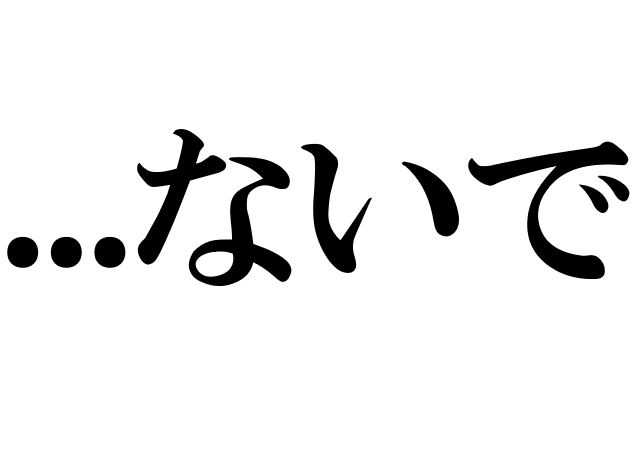



Japanese Grammar Exercise Making Negative Requests ないで
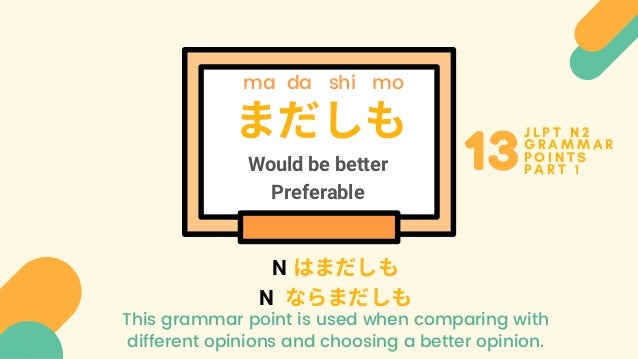



N2 Grammar Slide Part 1
Very Example sentences 1, 将来の事が心配でたまらない。 Shōrai no koto ga shinpai de tamaranai I am worried about the future 2, 私たちはあなたがいなくてとても寂しくてたまらない Watashitachi wa anata ga inakute totemo sabishikute tamaranai We do not have you, it is very sad 3, その話をしてよ。Hung Lee Japanese grammar n5, JLPT N5 Today, we will introduce to you Japanese grammar n5 13 ~なかなか~ない not easy to, struggling to, not able to This article will give you the usage, meaning, structure of grammar, besides theほど~ない (hodo~nai) Meaning is not as as~ How to use the Noun ほど Verb (ない form) Noun ほど Adjective (ない form) Explain Expressing the idea of using A as a standard for comparison, B is not equal to A Example sentences 1 東京ほど家賃の高いところはない。 toukyou hodo yachin no takai tokoro wa nai




Japanese Grammar ないてください Naide Kudasai N5 Please Don T Do




Ejercicio De Bank Soal N4 As 4 文法
たまらない (tamaranai) Meaning Unbearable ;*変に意味がなかなか分かる。→なぜかわからないけれども意味がわかります。(If you want to use なかなか there, このレッスンは"なかなか"わかりやすいです。) You use a verb with 「なかなか」in a negative sentence なかなか〜ない or 時間がかかる/苦労する etc来る・くる (to come) → 来ない・こない (not come) And if you want to say "I have to do <something>", all you have to do is to change the ない into なきゃ So Not eat = 食 た べない Have to eat (inf) = 食 た べなきゃ That's how you say "I gotta eat/I have to eat" informally!
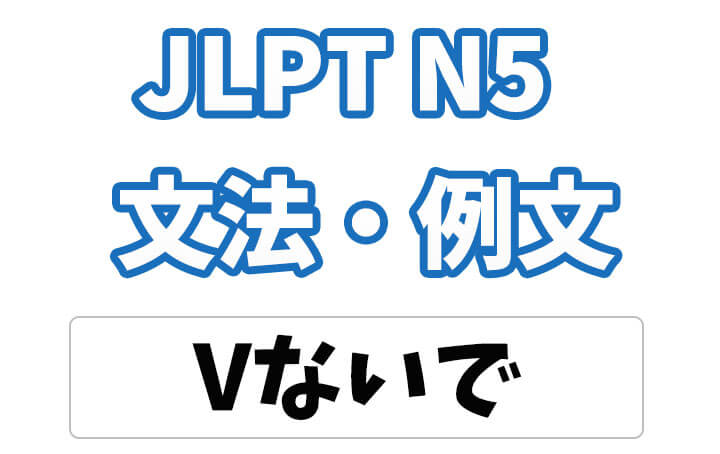



Jlpt N5 文法 例文 ないで 日本語net




Without なしで ないまま なくて ないで Jlpt N4 Grammar Chika Sensei S Japanese Academy
Can't help but do ~ Click the image to download the flashcard Download all N2 grammar flashcards JLPT N2 Grammar Master Ebook Access ALL extra downloads, ebooks, and study guides by supporting JLPT Sensei on Patreon1 When there's something that must or must not be done 2 Using 「だめ」, 「いけない」, and 「ならない」 for things that must not be done 3 Expressing things that must be done 4 Various shortcuts for the lazy 5 Saying something is ok to do or not doより仕方がない (yori shikata ga nai) Meaning to have no choice but to ;




日本語大好き Jlpt N3 Grammar Facebook




Learn Jlpt N3 Grammar ずに Zuni Japanesetest4you Com
もっと残業が減らないものかと、ずっと考えている。 ** a:インターネットで見えない相手に悪口を言う人って多いですよね。 b:ええ、顔が見えなくても、相手の気持ちを考えられないものでしょうか。 ** 私はお金が欲しいですが、働きたくないです。OK Kanshudo Boost is our most powerful tool for building and testing your knowledge of Japanese It combines multiple learning modes using a wide variety of different games and exercises, and integrates your knowledge of kanji, words, and grammar Boost is free to use, but you need to be a Registered User of Kanshudo例文 このサイズでも 読め ないことはない が、できれば縮小印刷をしないで欲しいというのが本音です。;




The Preparatory Course For The Jlptn4 Yomu Kanji Vocabulary Grammar Isbn




Jlpt Level 4 Grammar Frontline Mirai Institute Facebook
JLPT N1 Grammar ずにはおかない / ないではおかない (zu niwa okanai / nai dewa okanai) Meaning will definitely/certainly do something;Appears to ~ This is used it to describe something or someone (not yourself) who looks~ / seems~ / appears to~ It is similar to そうに・そうな (sou ni / sou na), but げ (ge) is much more restricted withNot intend to, not want to do something Always go with conscious verb For example 1 ただ親は見合いに行かせました。 僕は彼女と結婚しようともしない。 Tada oya wa miai ni ikase mashi ta Boku wa kanojo to kekkon shiyo u to mo shi nai That was just because my parents forced me to go to a blinddate (a dating arranged by others)
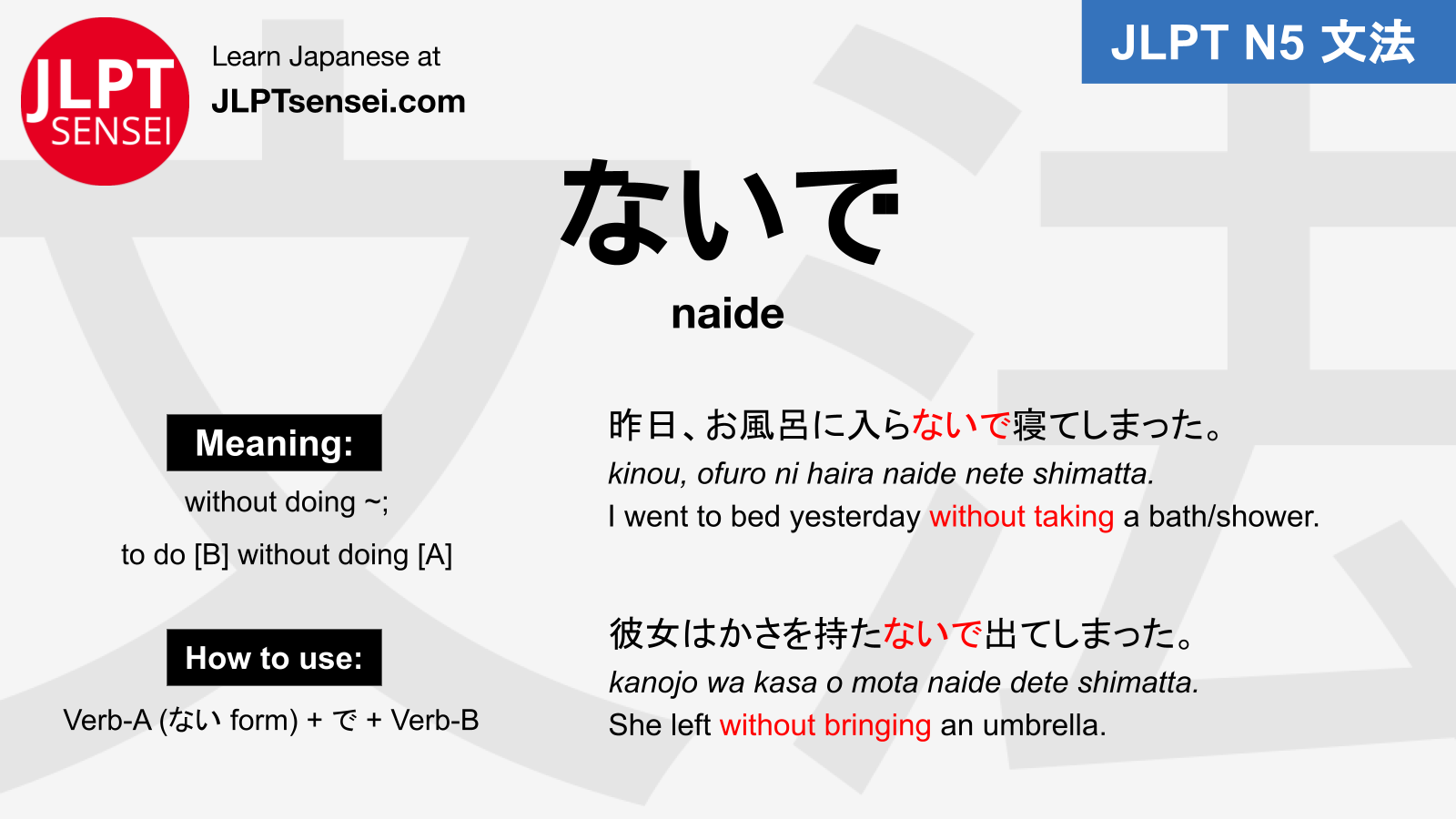



Jlpt N5 Grammar ないで Naide Meaning Jlptsensei Com
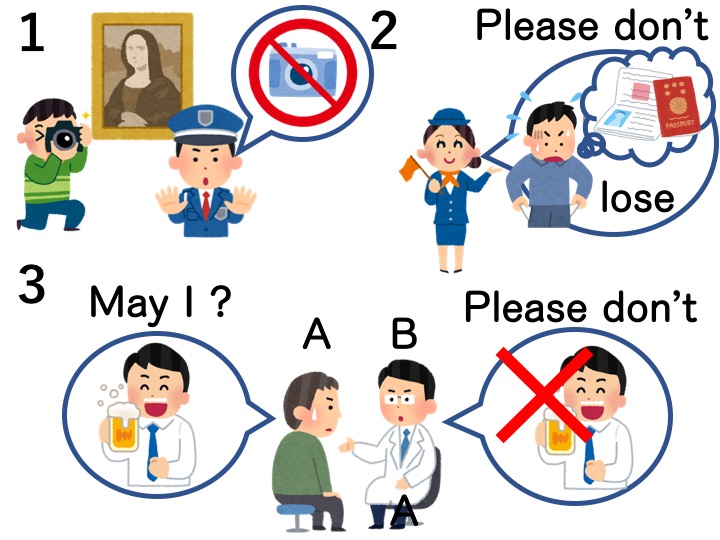



Lesson 78 ないでください Please Don T Japanese Language Note
息子の言葉が 信じられ ないことはない が、不安なので息子のクラスメートのお母さんにこっそり⑧ 忘れないうちに言っておくけど、例の件、延期になりました。 (2)「〜うちに+状況や状態の変化」 間に、while ① テレビを見ているうちに寝てしまいました。 ② 知らないうちに、バッグがなくなっていました。 <漢字の読み>No match for ~ Meaning 1) You don't have to bother to ~ / There is no need to This is used when you gently




Grammar Worksheets And Online Exercises




n4文法 ないで Youtube
Japanese ていない grammar teinai JLPT level N5 Formation Vて いない Meaning and how to use Something is not done, relized For example 1` 宿題をまだしていない。 Shukudai o mada shi te i nai I haven't done my homework yetはならない Learn Japanese grammar てはならない (tewa naranai) Meaning must not;Meaning and how to use Mean "very, extremely", "there is no otherway but " For example 痛くて痛くて泣きたくてしょうがない。 Itaku te itaku te naki taku te shouga nai I'm hurt, I really want to cry 悪い点を取って、悲しくてしょうがない。 warui ten o totte, kanashiku te shouga nai I got bad mark, so I was very sad
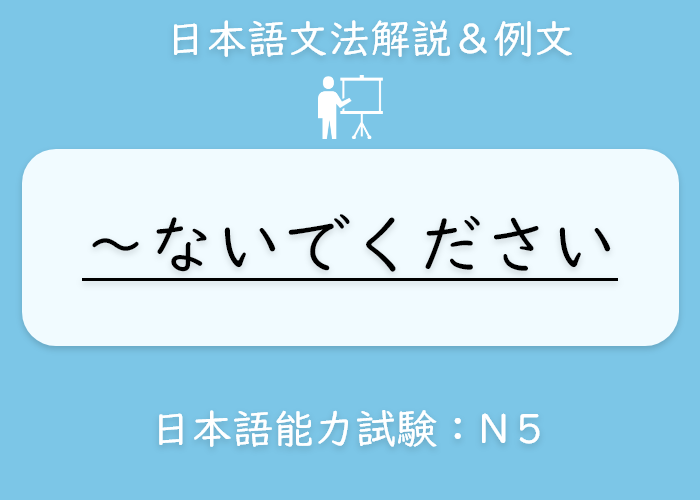



イラスト 英語 ないでください の文法説明 Langoal



n3文法 ずに済む ないで済む なくて済む 毎日のんびり日本語教師
There is a similar grammar rule ~といい Vしないといけない・ならない = have to do something You often omit the last part いけない・ならない and leave the sentence unfinished on purpose If you are talking to yourself, I have to be able to read it in Japanese文型:〜ないとも限らない もしかしたら〜かもしれない / 絶対にそうだとは言えない v(ナイ形) とも限らない n じゃないとも限らない n2 例文 ・日本の電車は時間に正確だと言われ次の日曜日は、大雨が 降らない 限り 、川掃除を実施します。 謝らない 限り 、彼女は絶対に許してくれませんよ。早く謝ったほうがいいですよ。 残業を しない 限り 、納期には間に合わないと思います。 今以上に 頑張らない 限り 、希望大学には合格




Jlpt N4 Grammar させる Saseru Causative Form Meaning Jlptsensei Com




Ejercicio De Iitomo Ch3 Grammar Worksheet
Kamoshirenai Kamoshirenai, or the more formal kamoshiremasen, is a grammar function used to express that something "might" happen The level of certainty in that "might" is probably hovering around 50% (though no one's keeping track) This means that the probability of accuracy is a little less than a darou sentence and a lot less「〜にならない」とは? For a more literal translation to address your question about the meaning of にならない 提出に遅れた場合は;JLPT N3 Grammar List This is the list of grammar rules you need to study for the Japanese Language Proficiency Test level N3 Click on each grammar for more details The link to download the printable PDF file of this list can be found at the end of this post The link to download JTest4You's N3 grammar ebook (566 pages) can be found here




Ejercicio De Bank Soal N4 As 3 文法




Jlpt N5 Grammar ないでください Naide Kudasai
In the event (case) of a late submission (結果が)減点にならない (the outcome) will not be a point deduction ExplanationOf course, I've done some research myself but can't seem to find a solid answer online Asked some natives and they said they are the sameThere is no way How to use the Verb short form より仕方がない Explain Expressed for reason, there is no other choice Example sentences 1, 彼女を待つより仕方がない。 Kanojo o matsu yori shikata ga nai There is no choice but to wait for her
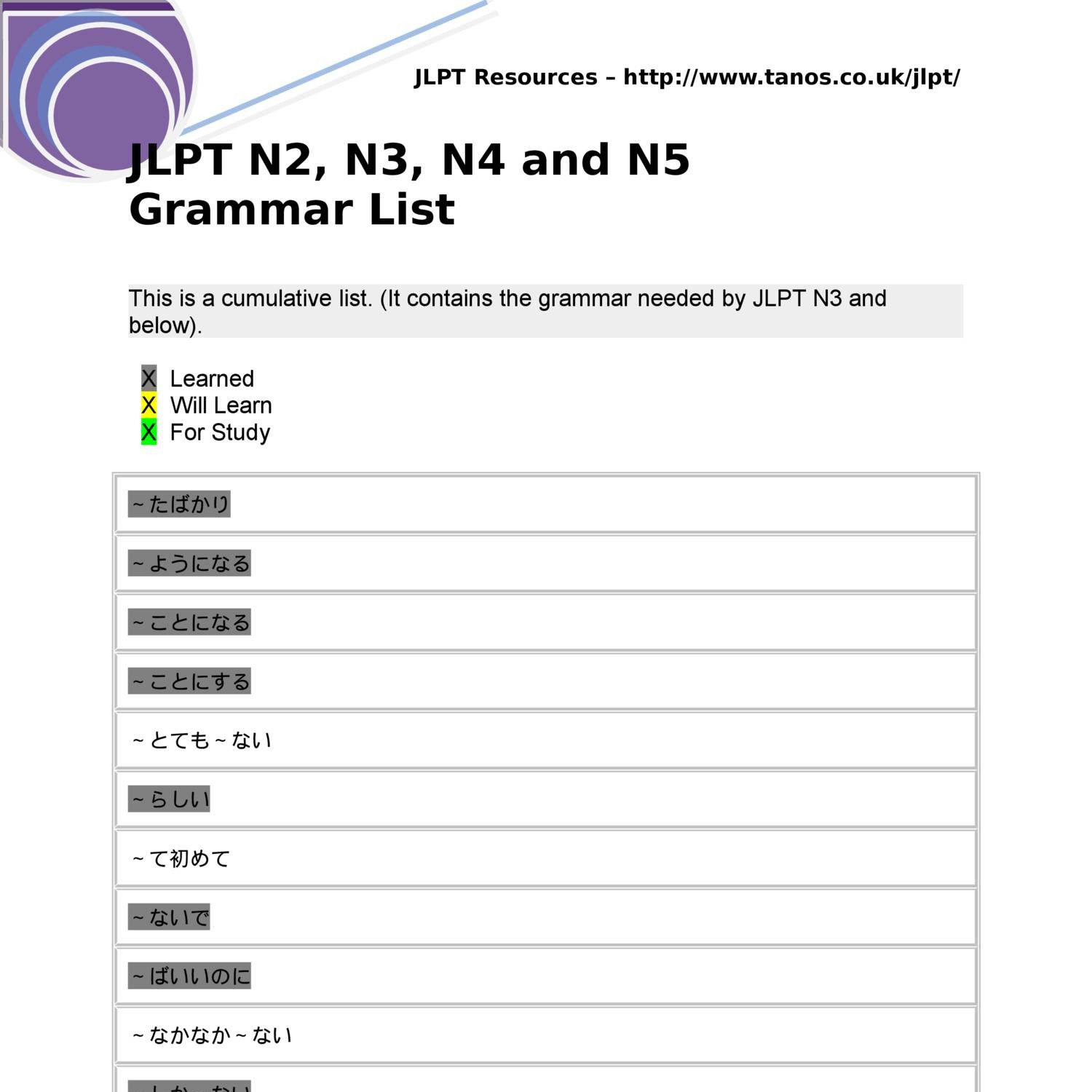



Grammar List N2 To N5 Doc Docdroid



N5 Grammar Notes 14 てください ないでください な Japanese School Amino
Learn Japanese grammar には及ばない にはおよばない(niwa oyobanai) Meaning there is no need to;The ず negative form of a verb is an archaic form which simply uses ず instead of the modern ない In this construction, the ず negative is combined with the negative potential form of いる (to be / to exist), which means 'cannot be'Japanese Grammar – Verbs Plain form to Masu form – Review Notes As we learned in our last Japanese grammar lesson, there are 3 types of Japanese verbs In today's grammar lesson, we learned how to change verbs in each of the 3 verb classes from Plain Present Affirmative form to Plain Present Negative form, also known as naiform In these video review notes we will go over




ないでください Forma Imperativa Negativa Nihongo Library




Jlpt N4 Grammar て欲しい Meaning I Want You To Need You To Used To Ask Somebody To Do Something For You これを見てほしい I Want You To Look At This これを見 ないでほしい I Don T
たいして〜ない vs あまり〜ない Archived たいして〜ない vs あまり〜ない Grammar What is the difference of nuance between them?英語は理解のためのヒントです。 ① I didn't like it very much, but I ate it because she made it for me, so I thought I couldn't help eating it ② I promised to take N1 absolutely, so I can't give up here ③ This book is borrowed from a person, so I can't lend it ④ This job is a job requested by the president, so I don'tIs one more formal than the other?




n2文法 ないではいられない ずにはいられない Youtube




Jlpt N2 Grammar ないではいられない Nai Dewa Irarenai Meaning Jlptsensei Com
JLPT N3の文法 ぶんぽう grammar 「dictionary formことはない」= 〜しなくていい。〜する必要はない。Vない形/ナaなでない/イaいくない/nでない+ことはない 意味が2つあります。 どんなときに使う? 「私は~だと思う」「私は~が好き/嫌い」など、自分の考えを言うときに使います。 意味1 絶対~だ。なんかない nankanai なんかものか nankamonoka やなんか yananka above is Japanese なんかない grammar nankanai if you don't understand the signs we used in fomation, you can find their meaning here signs used in Japanese grammar structures You can search the structure you want by using the search tool on




Jlpt N5 Grammar Game Gengo Textbook




ないでほしい Jlptn5 Grammar文法 例文 Ngữ Phap 日本語専門家 Japanese Expert
Should not ~ Click the image to download the flashcard Download all N2 grammar flashcards Download our complete JLPT N2 Grammar Master Ebook Access ALL extra downloads, ebooks, and study guides by supporting JLPT Sensei on Patreon文型:〜にすぎない 意味:ただ〜だけだ 質的・量的に程度の低さを強調する表現。 英訳 Emphasizes the low level of something in terms of quality or quantity 接続 V普 にすぎない A普 にすぎない Na (である) にすぎないHow to use 使い方 Learn Japanese grammar ないではいられない (nai dewa irarenai) Meaning can't help but feel;




ずに済む Zu Ni Sumu Japanese Quizzes




Japanese Grammar Listening 2 For Android Apk Download
Meaning (not) at all How to use the 全然 Verbないform Explain Adverbs denote the degree, and when they function as a modifier, they are preceded by the verb Meaning completely no, always go with the negative sentence Example sentencesNoun (very limited) Learn Japanese grammar 気 げ (ge) / げに (ge ni) / げな (ge na) Meaning looks like;I believe the general grammar for 「ないことはない」 means can;




Jlpt N5 文法 例文 ないでください 日本語net
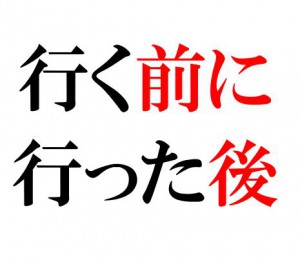



Japanese Grammar Exercise Expressing Without ないで ず




Jlpt N5 Grammar ないで Naide Meaning Jlptsensei Com




日本語の文法 例文 ないで 日本の言葉と文化




用表格速懂なくて ないで 王可樂日語 最台灣的教學 最好懂的日語 線上課程 小班教學




Learn Jlpt N4 Grammar ないで Naide Japanesetest4you Com




Jlpt N2 文法 例文 ずにはいられない ないではいられない 日本語net




イラスト 英語 ないで 二者択一 の文法説明 Langoal




Jlpt N4 Grammar ないで Nai De




Jlpt N5 Grammar Game Gengo Textbook




Jlpt N3 Grammar You Need To Know How To Use ないで ず And ないうちに Kawa Kawa Learning Studio




Riki Nihongo Dayo N2 Jlpt 17 50 文法 ないですむ Vs なくはない Learn Japanese Facebook




Negative Sequential And Parallel Actions ないで なくて And ずに
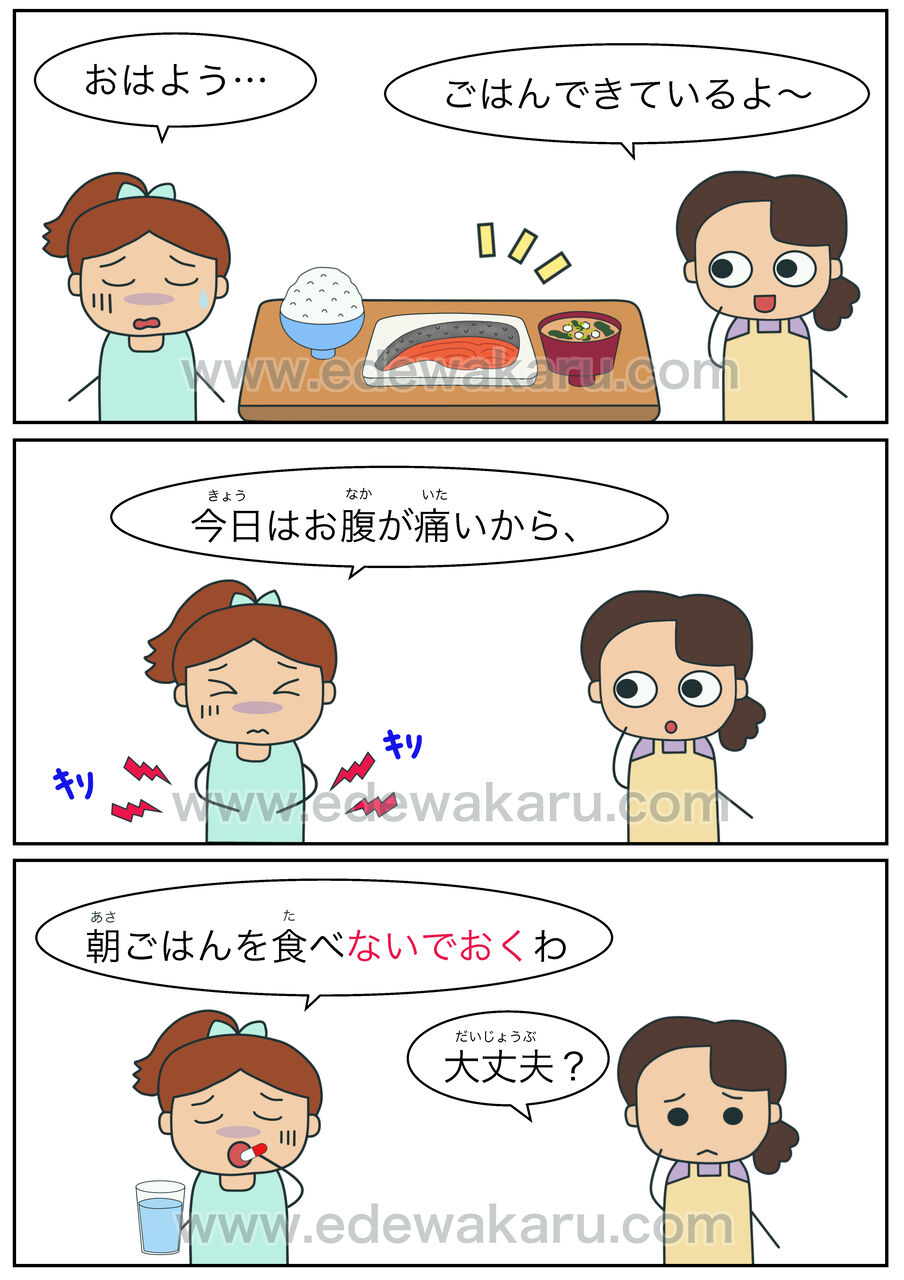



ないでおく ずにおく 日本語能力試験 Jlpt N3 絵でわかる日本語




ないで Naide Jlpt N4 Grammar List




Japanese Grammar 100 Part V Learn Japanese Online Free Lessons Makoto Membership




Learn Jlpt N2 Grammar ないではいられない Nai Dewa Irarenai Japanesetest4you Com




Jlpt N2 Grammar Review なくて済む ないで済む ずに済む Get By Without Doing Sth Unpleasant Youtube




Crunchy Nihongo Japanese Grammar Expressing Without Doing With




上にgrammar Jlpt Chchl




ないでください Japanese Quizzes
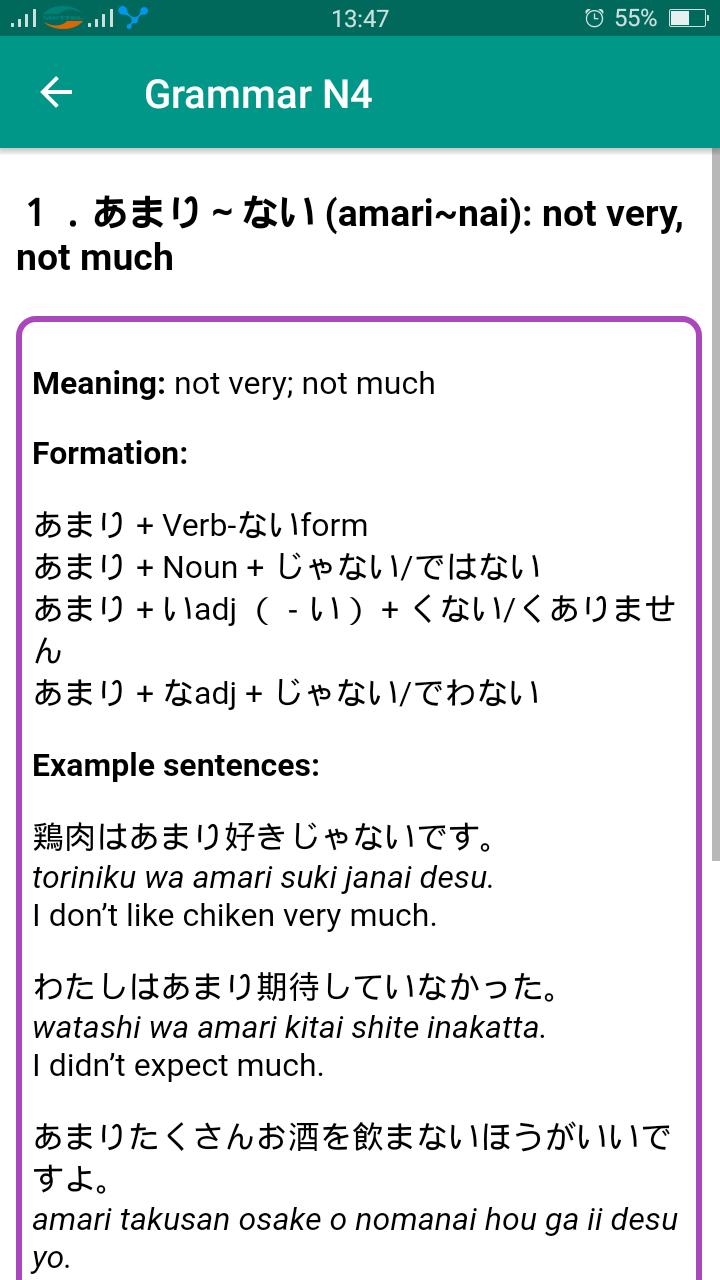



Japanese Grammar Jlpt N4 For Android Apk Download




N5 Japanese Grammar 写真 しゃしん を撮 と らないでください Please Don T Take Photos Lesson 日本語 Jlptn5 Youtube




Japanese Mini Grammar Lesson Expressing Don T With ないでhappy Learning Us Learn Japanese Learn Japanese Words Japanese Language
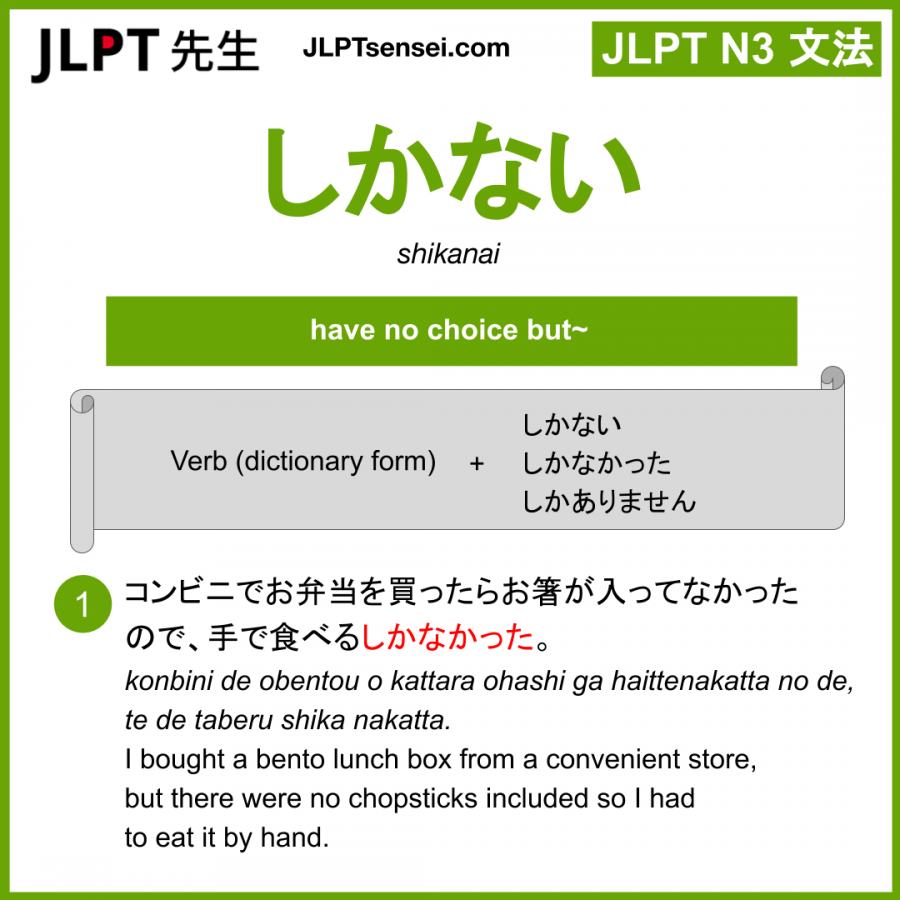



Jlpt N3 Grammar しかない Shika Nai Learn Japanese Jlpt Sensei




Jlpt N2 Aないではいられない ずにはいられない Kicl Online Japanese Grammar Lesson Youtube




Jlpt N5 文法 例文 ないでください 日本語net




Learn Jlpt N4 Grammar てほしい Te Hoshii Japanesetest4you Com




L17 1 Vない形 ないでください みんなの日本語17課教案と教材 初級日本語 みんなの日本語教案 教材サイト Minnna No Nihongo 初級日本語




Jlpt N2 Grammar ようではないか You Dewa Nai Ka Meaning Jlptsensei Com




Learn Jlpt N4 Grammar あまり ない Amari Nai Japanesetest4you Com
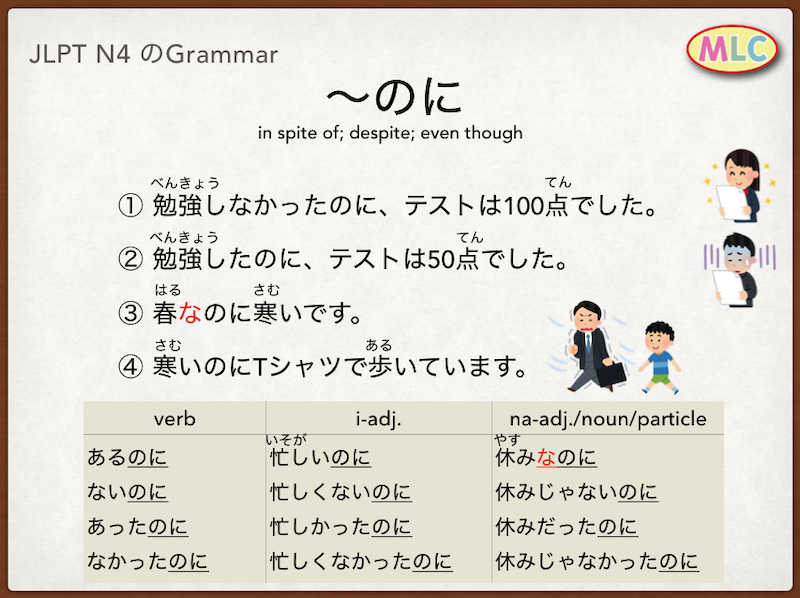



Jlpt N4のぶんぽう Grammar のに なのに Mlc Japanese Language School In Tokyo




イラスト 英語 て ないで の文法説明 Langoal




Japanese Grammar Exercise Expressing Without ないで ず




Learn Japanese Grammar ずに済む なくて済む Zu Ni Sumu Nakute Sumu Idioma Japones Aprendiendo Japones Japonesas




Learn Jlpt N5 Grammar ないでください Naidekudasai 画像あり 英単語 文法 日本語の文法




Jlpt N2 Grammar ないですむ ないで済む Naide Sumu Naide Sumu
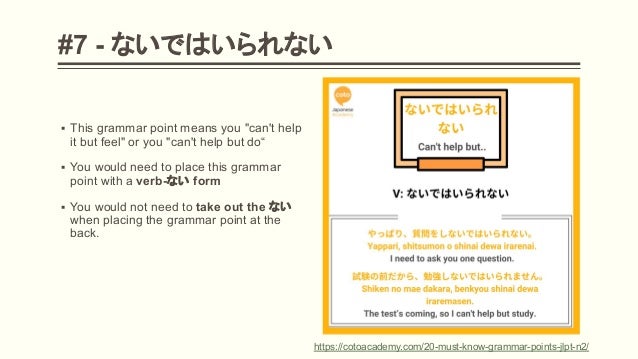



Grammar Points For Jlpt N2




Jlpt N4 Grammar ようにする You Ni Suru Meaning Jlptsensei Com



Jlpt N4 Grammar ないで Naide Explanation And Examples




N5 Grammar List Page 10 Of 14 Japanese Quizzes
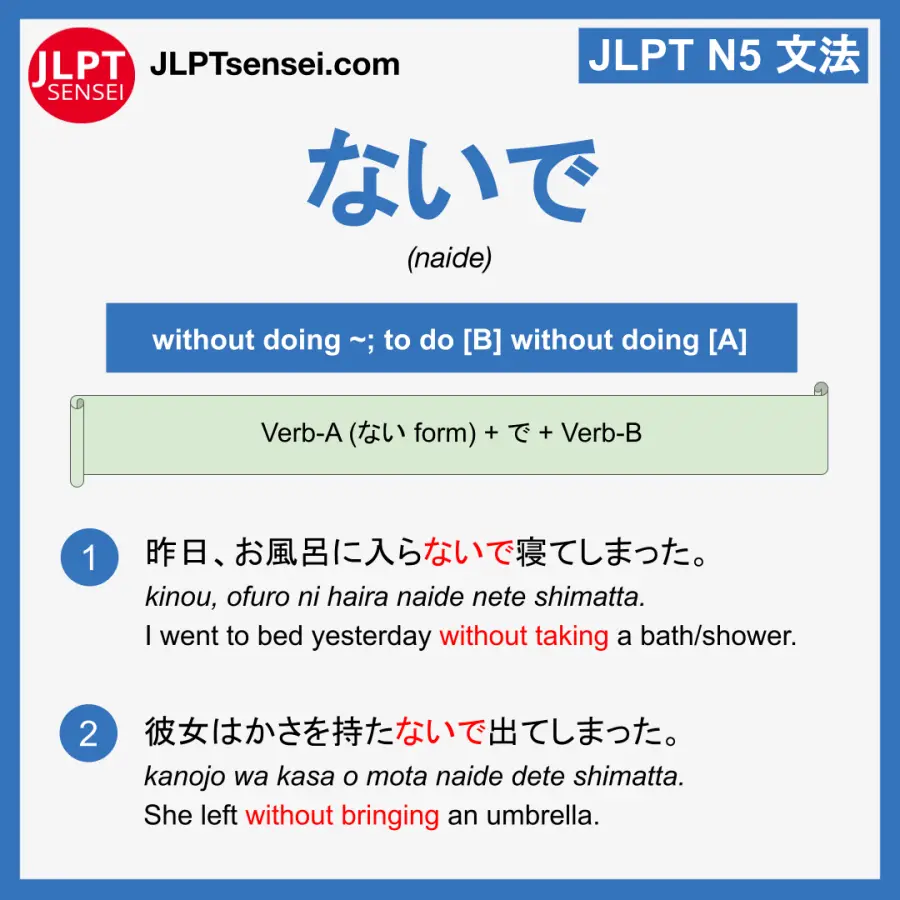



Jlpt N5 Grammar ないで Naide Meaning Jlptsensei Com




N2文法 なくて済む ないで済む ずに済む 不用 也沒關係 谷子塾




ないで Naide Jlpt N4 Grammar List
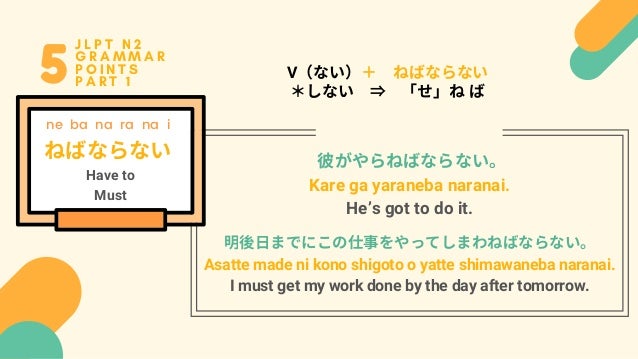



N2 Grammar Slide Part 1




Jlpt N5文法 第71回 Vない形 V Nai Form Learn Japanese Jlpt N5 Grammar Lesson 71 Youtube




てはいられない Tewa Irarenai Japanese Quizzes




N3 Grammar List Page 2 Of 21 Japanese Quizzes




ないで 日本語能力試験 Jlpt N5文法 絵でわかる日本語




Japanese Classroom ここで 写真を 取らないで ください Koko De Shashin Wo Toranaide Kudasai Meaning Please Do Not Take Photos Here Grammar ないでください Please Do Not Japaneseclassroom Japaneselanguage Japaneselearning Learnjapanese




N5文法 ないでください 日本語教師のまる得




Jlpt N4 Grammar ないで How To Say Doing B Without Doing A In Japanese Youtube




Jlpt N4 Grammar List Japanese Quizzes 日本の名言 ジャパニーズ 英単語




日本語 Learn Jlpt N5 Grammar すぎる Sugiru




そんなに Sonna Ni Jlpt N4 Grammar List
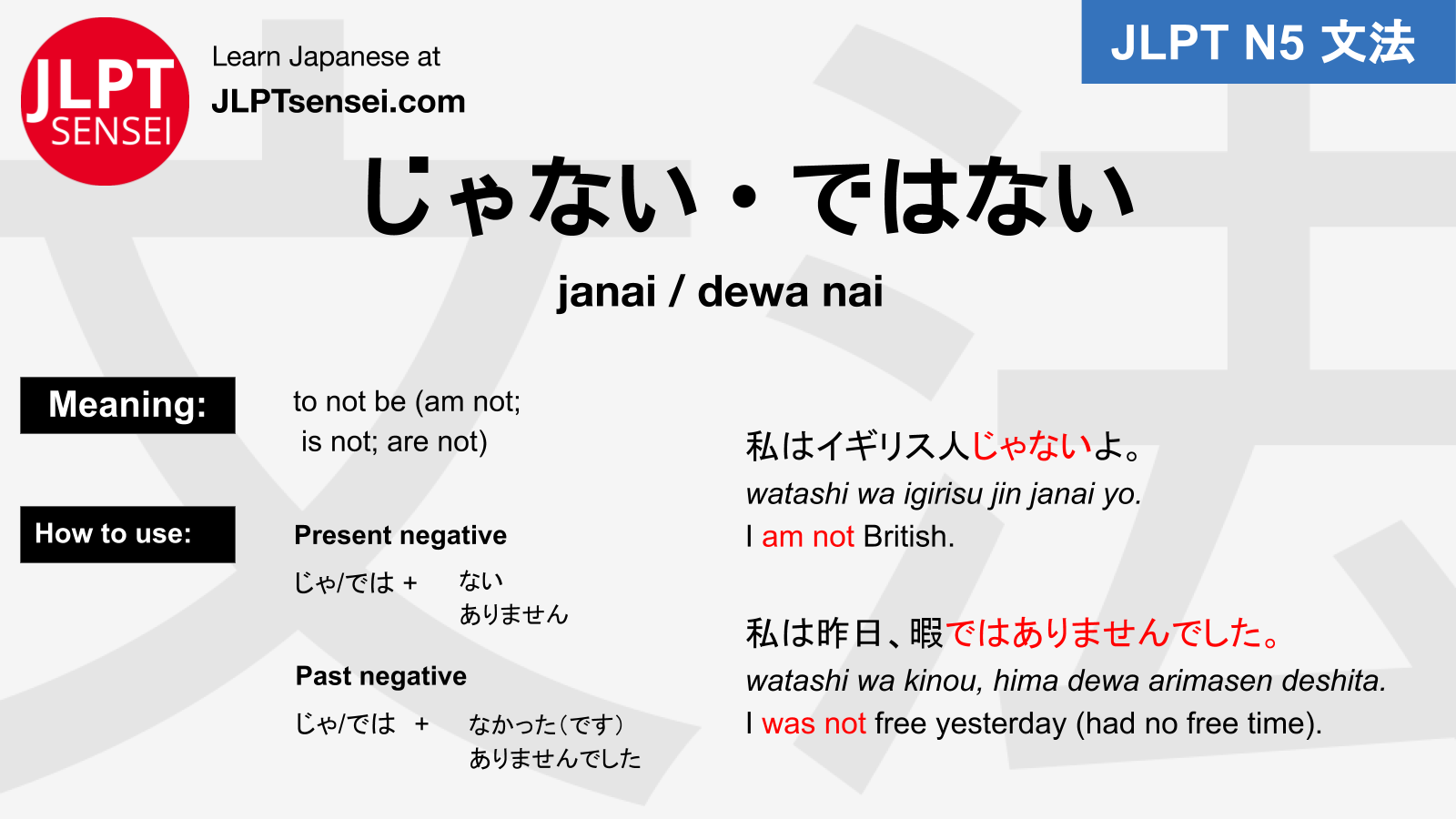



N5 Grammar じゃない ではない Janai Dewa Nai Learn Japanese Jlpt Sensei




Jlpt N3 Grammar You Need To Know How To Use ないで ず And ないうちに Kawa Kawa Learning Studio




Jlpt N5 Grammar ないでください Nihongo Net




The Preparatory Course For The Jlpt N2 Bun No Rule Kanji Vocabulary Isbn




ないではいられない ずにはいられない 日本語能力試験 Jlpt N2 絵でわかる日本語




Unit 1 2 Vce Japanese Grammar Patterns Diagram Quizlet




Jlpt N5 Grammar ないでください Naide Kudasai




Jlpt N2 Grammar なくて済む Nakute Sumu Meaning Jlptsensei Com




Jlpt N2 文法解説 例文 ないではいられない ずにはいられない 教材ダウンロード Taichi Blog




Jlpt N2 Grammar ようではないか You Dewa Nai Ka Meaning Jlptsensei Com




文法解説 日本語能力試験 Jlpt N5 て ないで 例文 導入 よく聞かれる質問も 日本語教師キャリア マガジン 旧称 日本語情報バンク




日本語の文法 例文 ないで済む なくて済む ずに済む 日本の言葉と文化




ないではいられない Nai Dewa Irarenai Japanese Quizzes




Jlpt N2 Grammar ないではいられない Japanese Language Japanese Language Learning Learn Japanese
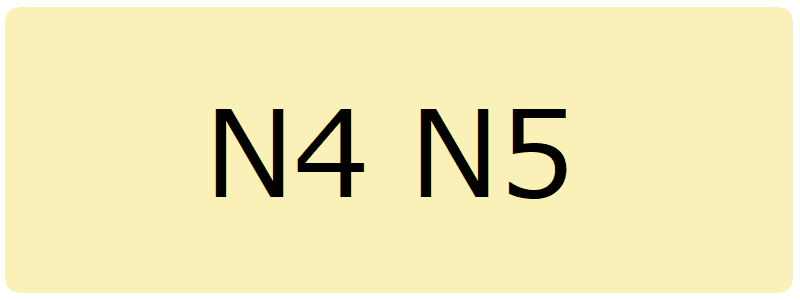



n5文法 ないで ずに 毎日のんびり日本語教師
コメント
コメントを投稿